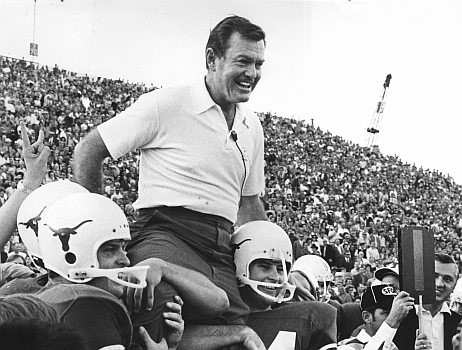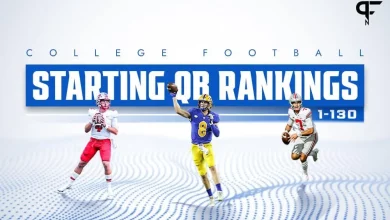Darrell Royal, who was the head coach of the University of Texas football team, the Texas Longhorns, from 1957 to 1976, is regarded by many as one of the top college football coaches of all time. He served as Texas’ head coach for 20 years.

Darrell K Royal, who led the University of Texas football program from 1957 to 1976, remains one of the most celebrated figures in the history of college football. Known for his disciplined approach, deep football intellect, and unshakable integrity, Royal not only brought unprecedented success to the Texas Longhorns but also helped shape the modern identity of the program. Over his 20-year tenure in Austin, Royal became synonymous with Texas football, leaving behind a legacy that still echoes across the Forty Acres and beyond.
Born on July 6, 1924, in Hollis, Oklahoma, Darrell Royal rose from humble beginnings to become a star quarterback at the University of Oklahoma. After serving in World War II, he returned to lead the Sooners on the field and eventually transitioned into coaching. Before arriving at Texas, he had coaching stints at Mississippi State and Washington, gaining a reputation as a rising star in the profession.
When the University of Texas hired Royal in December 1956, the football program was floundering, coming off a dismal 1–9 season. At just 32 years old, Royal inherited a team in need of both direction and identity. What followed was one of the most remarkable turnarounds in college football history.
In his first season, Royal led the Longhorns to a 6–4–1 record and a berth in the Sugar Bowl, instantly reviving the program. That was just the beginning. Over the next two decades, he compiled an extraordinary record of 167–47–5, making him the winningest coach in Texas history. Under his leadership, the Longhorns captured three national championships (1963, 1969, and 1970 as co-champions) and 11 Southwest Conference titles.
Royal’s teams became known for their physicality, discipline, and execution. He emphasized fundamentals, mental toughness, and team unity above all else. He also revolutionized the game with innovations like the Wishbone offense, a triple-option system that proved nearly unstoppable in the late 1960s and early ’70s.
Royal’s implementation of the Wishbone in 1968 helped launch Texas into a dominant era. Behind quarterbacks like James Street and running backs like Steve Worster, the Longhorns went on a 30-game winning streak and captured national titles in 1969 and 1970. The 1969 team’s iconic 15–14 win over Arkansas, dubbed the “Game of the Century,” remains one of the most celebrated games in college football lore.
Beyond the wins and championships, Royal earned respect for his character and leadership. He was admired by players, coaches, administrators, and fans for his honesty, loyalty, and humility. Royal often downplayed his own role in the team’s success, instead giving credit to his players and assistants.
He was also a staunch advocate for fairness and inclusion. Although Texas, like many Southern programs at the time, was slow to integrate, Royal played a key role in helping the school recruit and welcome African American players. He was instrumental in recruiting Julius Whittier, who became the first Black player to letter in Texas football history in 1970.
Royal resisted the pressure of win-at-all-costs tactics and refused to cut ethical corners. He was known for his motto: “You dance with the one that brung ya,” emphasizing loyalty and consistency over trend-following or panic changes.
Royal wasn’t a flashy or overly emotional coach. He was calm, meticulous, and focused on preparation. Practices were structured and purposeful. He demanded toughness but never cruelty, discipline but not humiliation.
His coaching philosophy was rooted in simplicity and execution. “Luck is what happens when preparation meets opportunity,” he famously said. He didn’t believe in trickery or gimmicks but rather in out-working and out-thinking the opponent.
Off the field, Royal was equally beloved. He was known for his dry wit and folksy wisdom. Stories of his one-liners and quotes are legendary in Texas football culture. Perhaps most famously, when asked why he didn’t pass the ball more often, Royal replied, “Three things can happen when you throw the football—and two of them are bad.”
Dozens of Royal’s former players have gone on to successful careers in football, business, and public service. Many credit him not only for making them better athletes but also for molding them into better men. His mentorship extended beyond football—he emphasized academics, integrity, and preparation for life after sports.
Hall of Fame linebacker Tommy Nobis, quarterback James Street, running back Earl Campbell, and wide receiver Johnny “Lam” Jones were just a few of the legendary players Royal coached or helped bring to Texas. Campbell, the 1977 Heisman Trophy winner, often credited Royal with shaping his college career and future.
Darrell Royal’s legacy has been cemented through a multitude of honors and tributes. In 1996, Texas renamed its iconic home stadium Darrell K Royal–Texas Memorial Stadium, making him one of the few college coaches to have a stadium named in his honor during his lifetime.
He was inducted into the College Football Hall of Fame in 1983 and remains a revered figure in both the University of Texas community and the broader football world. The school established the Darrell K Royal Research Fund for Alzheimer’s Disease, a cause close to Royal’s heart after he was diagnosed with the disease later in life.
Even after his retirement in 1976, Royal remained a presence in the athletic department as a special assistant and mentor to other coaches. He was frequently sought for advice and counsel and continued to champion the values of integrity, loyalty, and tradition.
Darrell Royal passed away on November 7, 2012, at the age of 88. His death prompted an outpouring of tributes from across the nation. The University of Texas, the NCAA, and the football community mourned the loss of one of the sport’s most respected figures.
Thousands attended his public memorial service at the stadium that bears his name. Longhorn fans, former players, rival coaches, and university leaders all paid their respects. The emotional tributes reflected not just his achievements as a coach but his impact as a leader, teacher, and Texan.
Darrell Royal’s career is one of the gold standards in college football history. A coach of rare intellect and unwavering principles, he elevated the Texas Longhorns to the pinnacle of the sport and laid the foundation for generations of success.
His influence continues to be felt in Austin and throughout college football. From his innovations on the field to his mentorship off of it, Royal was more than just a winning coach—he was a cultural figure, a moral compass, and a builder of men.
In an era of constant change in college athletics, Royal’s legacy endures as a reminder of what leadership, loyalty, and vision can achieve. To many, he will forever be remembered not just as a coach—but as the soul of Texas football.









